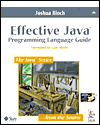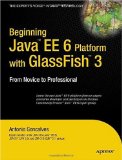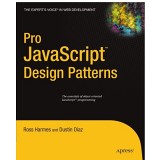 The Pragmatic Craftsman
:: Simplicity from complexity : by Stanley Kubasek ::
The Pragmatic Craftsman
:: Simplicity from complexity : by Stanley Kubasek ::
 The Pragmatic Craftsman
:: Simplicity from complexity : by Stanley Kubasek ::
The Pragmatic Craftsman
:: Simplicity from complexity : by Stanley Kubasek ::

Effective Java (2nd Edition)
by Joshua Bloch
ISBN 0321356683
Date Read 1/2011
My Rating

I read the 1st edition (my recommended book) a few years back. I just re-read the 2nd edition. It’s one of the best Java books around (the other must read would be Java Concurrency in Practice).
Read it.
Re-read it.
The 2nd edition is a little harder to read. Some chapters are too long and are not as cohesive (not like they were in the 1st ed), but still, getting all these tips from a Java champion is very valuable. At the very least, you can use his tips to win your arguments and influence others on your team.
And that’s the reason I’m recommending this book: read it to become a better Java programmer. Isn’t that a good reason? ![]()

Pro JPA 2: Mastering the Java™ Persistence API
by Mike Keith, Merrick Schincario
ISBN 1430219564
Date Read 4/2010
My Rating

If you’re learning or planning to learn JPA 2, you must own this book. Why? It’s the most complete book on the subject out there. It’s like a JPA bible.
Just a warning: It’s not an easy read. You will most likely have to read some (if not all) chapters at least twice. Some even more. For your first read, it will probably feel dry. Only after you learn by doing, by practicing, you will start “getting it.” This was at least my experience. I really started seeing the power of the book after reading selective chapters again. But of course, your experience might be different.
This is your JPA 2 bible. JPA 2 seems easy on the surface. But if you’re doing a project at work and it requires some advanced mapping, for instance, it’s not so trivial. The nice thing about this book is that it covers the advanced topics as well. And it shows you plenty of examples.
Few missing pieces. Cache coverage is light. Not much to it. Sometimes I felt that a full example, rather than a snippet, would be more appropriate. A few times I had to search the internet to get it to work. And as I mentioned before, this book is not an easy read, be prepared.
Excellent job by the authors. Excellent resource on JPA2, which I think is a great ORM spec.

Pro JavaScript Design Patterns
by Ross Harmes, Dustin Diaz
ISBN 159059908X
Date Read 6/2009
My Rating

After reading a few books on JavaScript, I wondered… I wish there was a JavaScript book on Design Patterns. I was very glad when I found this book! It’s an advanced book loaded with great content, interesting style, and practical examples.
2 in 1. Not only do you get a refresher on Design Patterns, but you get to see some advanced JavaScript. It’s a really good combination.
Design Patterns/Javascript combination. This is a design patterns/JavaScript book. That said, you will not really learn JavaScript from it. Similarly, if you want to learn Design Patterns, you are better off going somewhere else. But if you combine these two, and don’t really focus on either one, you get a nice result. That’s exactly what this book is all about: how to implement some GoF patterns in JavaScript.
Design patterns. Which ones? Not all of them, but majority. Looking at the TOC, 12 GoF patterns are covered (Singleton, Factory, Bridge, Composite, Facade, Adapter, Decorator, Flyweight, Proxy, Observer, Command, and Chain of Responsibility). Plus the authors included chapters on Interfaces, Encapsulation, Information Hiding, Inheritance, and Chaining.
Best practices. The authors focus on creating best-practices solutions. I love that. I also love the authors style of code. You get to learn several different styles of creating JavaScript objects. (Could use a bit more explanation about them, but this is not an intro book.) I like to learn from examples, and there are plenty in this book.
Heavy on code examples. Light on explanation. I said it before, the way this book is written makes it suitable for you only if you have a good grasp of JavaScript and GoF Design Patterns. But still, I found this book hard to understand at times. I lost focus a few times. I think the authors could have done a much better job in this regard. The authors briefly explain the pattern and then they give you a long example. A short explanation follows. Very brief. If you don’t understand the full example, you’re out of luck. I would like to see short snippets extracted from the full example and explained. Repeated. So you learn better. And clearer that way.
Plan to re-read. You are most likely not going to “get” this book on your first read. I plan to re-read it. I will take it as an opportunity to deepen my GoF design patterns knowledge. Sort of read two books at once. Sounds like a plan. ![]()
I really liked this book. Design patterns knowledge is very relevant. JavaScript is gaining popularity and getting more advanced. It’s becoming a real programming language. I am still surprised how far it has come. This book is a really good gift to both communities. I highly recommend this book. It’s just the the book I was looking for!
I came across a list of Five books every Java developer must own by Rob Sanheim. I commented on the list. But the list got me thinking. What are the books that I consider the “must have” books? Today’s Javalobby newsletter just added to the fire. I had to create the list. So here it is.
1) Effective Java, Joshua Bloch
A lot of people just code in Java, without being aware of the implications. This book clears out those implications.
2) Code Complete 2, Steve McConnell
This book will make you a better programmer. Enough said. My favorite.
3) Refactoring, Martin Fowler
It is getting a little old, but it contains invaluable information on good design, code smells, and more.
4) Design Patterns, GoF
The best book on patterns, though not an easy one. Might want to get the Head First Design Patterns to help you.
5) Core J2EE Patterns, Deepak Alur, Dan Malks, John Crupi
You have to know GoF patterns if you call yourself a good programmer. You have to know Core J2EE patterns if you want to be a good Java programmer.
6) Agile Software Development: Principles, Patterns, and Practices, Robert Martin
Not an easy book, but a best book on Agile, good Object Oriented programming, and patterns.
7) Applying UML and Patterns, Craig Larman
Java is an Object Oriented language, but a lot of people still treat classes as data structures. Learn what an object, and OO programming is all about.
8) Pragmatic Programmer, Andrew Hunt, David Thomas
Contains sound practices, good advice. It will make you a better programmer.
9) Facts and Fallacies of Software Engineering, Bob Glass
See what works in software engineering, and what doesn’t. Bob Glass explains it best.
10) Don’t Make Me Think, Steve Krug
A great little book, great when you’re involved in UI.
Wait List
I have not read these, and that’s why I have not put them in my original list, but the books below should be on your must-read list.
Peopleware, Tom Demarco, Timothy Lister
Domain Driven Design, Eric Evans
The Timeless Way of Building, Christopher Alexander
Patterns of Enterprise Application Architecture, Martin Fowler
Reference
Five books every Java developer must own, Panasonic Youth blog
Javalobby discussion, my list on the bottomJavalobby Newsletter: archives (great newsletter, btw)